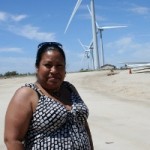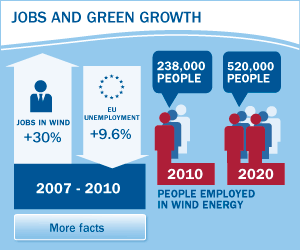 A Native American leader from southern California is promoting wind power as a valuable tool for her tribe’s economic development and environmental stewardship strategies.
A Native American leader from southern California is promoting wind power as a valuable tool for her tribe’s economic development and environmental stewardship strategies.
Monique La Chappa, chairwoman of the Campo Kumeyaay Nation in San Diego County, said on Sunday that the first wind farm the tribe developed was so successful that another wind farm is currently being planned.
La Chappa said in a newspaper article that wind power is clean, creates jobs and wealth, preserves habitat and poses no national security threats. continue reading »
 Although many politicians in the US are still in denial about global warming and the nation’s frightening addiction to expensive, imported oil, President Barack Obama’s government continues promoting the development of an offshore wind sector.
Although many politicians in the US are still in denial about global warming and the nation’s frightening addiction to expensive, imported oil, President Barack Obama’s government continues promoting the development of an offshore wind sector.
The latest evidence of the government’s realisation that wind power can help mitigate climate change, provide increased energy security and be part of a new green economy occurred earlier this week with an announcement that $50.5 million (€37.1 mn) has been earmarked to support the offshore sector.
Interior Secretary Ken Salazar and Energy Secretary Steven Chu said the money will be used for projects that support offshore wind power deployment and several high priority wind energy areas off the mid-Atlantic coast “that will spur rapid, responsible development of this abundant renewable resource.” continue reading »
 London in Victorian times and beyond was infamous for its thick smog, caused by the extensive burning of coal industrially and domestically, which cloaked the city and made its inhabitants ill. A century or so down the line, the air of Europe’s cities may not be quite so polluted, but we still appear to have a lurking appetite for coal, and a growing appetite for gas.
London in Victorian times and beyond was infamous for its thick smog, caused by the extensive burning of coal industrially and domestically, which cloaked the city and made its inhabitants ill. A century or so down the line, the air of Europe’s cities may not be quite so polluted, but we still appear to have a lurking appetite for coal, and a growing appetite for gas.
In 2010, Europe installed more coal power plants than it decommissioned for the second time in 12 years.[1] EWEA’s 2010 statistics show that while 1,550 MW of coal capacity was taken offline, 4,056 MW were added. Simply put, we added 2.5 GW of coal – the equivalent of about five new power plants.
At a time when the EU rightly prides itself on its leading role in international climate negotiations, its world-class renewable energy industry and forward-thinking climate and energy legislation; when more wind and other zero-carbon power capacity is installed in Europe year on year; when a majority of EU citizens are alarmed by the reality of climate change; it is worrying that we are installing more of the world’s dirtiest, most harmful fossil fuel. continue reading »
 The power of wind as a positive force was supported on both sides of the Atlantic on Monday with the release of a new survey conducted by a US research firm and an opinion article published in an English newspaper.
The power of wind as a positive force was supported on both sides of the Atlantic on Monday with the release of a new survey conducted by a US research firm and an opinion article published in an English newspaper.
Wind power was seen as either “favourable” or “very favourable” by 75% of people who responded to a Pike Research survey. In addition, wind energy had “unfavourable” responses of only 5%.
The consumer survey, conducted by the Colorado-based firm last summer, canvassed 1,042 Americans on their attitudes and awareness of 12 energy and environmental concepts. The margin of error for the survey results is around 3% with a 95% confidence interval. continue reading »
 Last week WWF released a major report arguing that the world’s entire energy needs could be met “cleanly, renewably and economically” within four decades.
Last week WWF released a major report arguing that the world’s entire energy needs could be met “cleanly, renewably and economically” within four decades.
Published in conjunction with energy consultancy Ecofys and the Office for Metropolitan Architecture, ‘The Energy Report’ noted there are no technological or financial reasons preventing wind power and other renewables from creating a carbon-free world by 2050.
“If we continue to rely on fossil fuels, we face a future of increasing anxieties over energy costs, energy security and climate change impacts,” WWF Director General Jim Leape said on Thursday in an accompanying press release. continue reading »
 A Native American leader from southern California is promoting wind power as a valuable tool for her tribe’s economic development and environmental stewardship strategies.
A Native American leader from southern California is promoting wind power as a valuable tool for her tribe’s economic development and environmental stewardship strategies.









